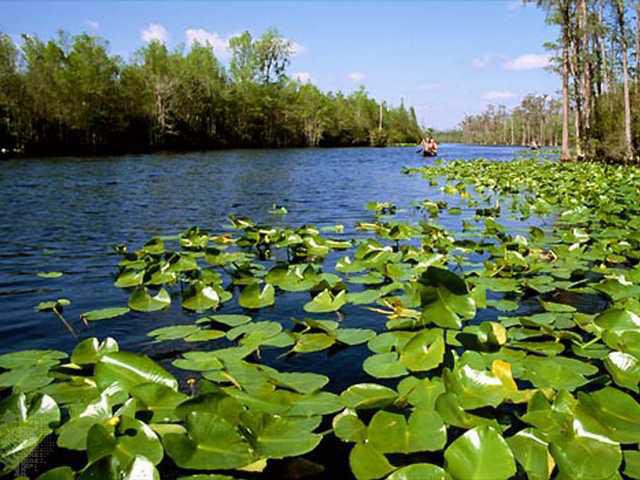The mysterious Okefenokee Swamp has long been the source of myth, lore and legend. The land of the "trembling earth," as the Indians called it, is a vast 700-square mile wilderness of grasslands, wetlands, lakes and peat bog islands anchored by towering cypress trees growing from still, dark water. The Okefenokee's diverse natural environments and teeming wildlife have dominated the infrequent efforts of humans to tame it.
Indian artifacts date back some 4,000 years. The first European settlement occurred in 1626 when the Spanish built a mission at the headwaters of the St. Marys River. In the 1850s, homesteading families moved in to create isolated lifestyles that became Okefenokee folklore. Entrepreneurs in the 1880s possessed more imagination than logic - attempting to drain the entire swamp into the St. Marys River. In 1909, a massive logging operation cut 425 million board feet of lumber over the next 18 years.
Visitors eager to experience the Okefenokee may choose from four parks, each with its own perspective. Just north of the swamp, near Waycross, is Laura S. Walker State Park, offering camping, fishing and golf. South of Waycross is the Okefenokee Swamp Park, featuring the wildlife of the swamp in a controlled setting. Further south, near Folkston, is the Suwanee Canal Recreation Area, providing water access to the prairie environment of the swamp. On the southwestern side near Fargo is Stephen C. Foster State Park, popular for its cypress swamps and fishing.
Information courtesy of www.coastalgeorgiaexperience.com
Indian artifacts date back some 4,000 years. The first European settlement occurred in 1626 when the Spanish built a mission at the headwaters of the St. Marys River. In the 1850s, homesteading families moved in to create isolated lifestyles that became Okefenokee folklore. Entrepreneurs in the 1880s possessed more imagination than logic - attempting to drain the entire swamp into the St. Marys River. In 1909, a massive logging operation cut 425 million board feet of lumber over the next 18 years.
Visitors eager to experience the Okefenokee may choose from four parks, each with its own perspective. Just north of the swamp, near Waycross, is Laura S. Walker State Park, offering camping, fishing and golf. South of Waycross is the Okefenokee Swamp Park, featuring the wildlife of the swamp in a controlled setting. Further south, near Folkston, is the Suwanee Canal Recreation Area, providing water access to the prairie environment of the swamp. On the southwestern side near Fargo is Stephen C. Foster State Park, popular for its cypress swamps and fishing.
Information courtesy of www.coastalgeorgiaexperience.com

